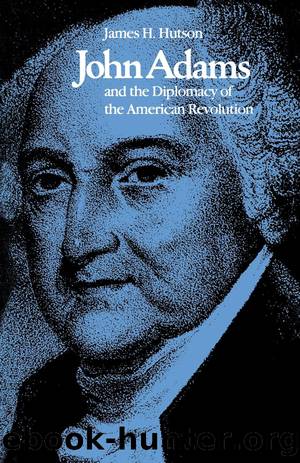John Adams and the Diplomacy of the American Revolution by James H. Hutson;

Author:James H. Hutson; [James H. Hutson]
Language: eng
Format: epub
ISBN: 9780813186306
Publisher: University Press of Kentucky
Published: 2021-02-15T00:00:00+00:00
CHAPTER 5
DUTCH RECOGNITION
In the fall of 1781 changes occurred in Dutch politics. On September 7, 1781, the British cabinet accepted a new Russian offer to mediate the conflict with the Netherlands. Galitzin, the Russian ambassador at The Hague, announced the British decision to the States General on November 9. âA new order of things had developed,â Vauguyon declared, for whether by accident or design the alteration in British policy coincided with a significant realignment of Dutch political forces. From the beginning of Anglo-Dutch hostilities Amsterdam had been the soul of the struggle against Great Britain. But in the fall of 1781 what Vauguyon described as a âgreat numberâ of Amsterdam magistrates, led by the burgomaster Rendorp, who had conducted the secret peace negotiations with Britain in July and August, sought a reconciliation with the stadtholder and his party.1 The rapprochement of âMessers dâAmsterdamâ with the passionately pro-British stadtholder, at the moment Britain accepted the Russian mediation, alarmed Vergennes. Were the Dutch about to conclude a dishonorable peace with Britain at Franceâs expense?2 Even if they refused to appease the British, the Dutch, by concluding a precipitate peace, would damage France. The arrival in Europe at the end of November 1781 of the news of the decisive Franco-American victory at Yorktown opened the prospect that Britain might be compelled to sue for peace. It was in Franceâs interest that a peace negotiation be generalâthat all the enemies of Britain negotiate with her concurrently. Vergennes feared that the British might try for quick settlements with the Netherlands and the United StatesâNorth and Fox explored these avenues in March and April 17823âin order to intensify the war against France to obtain better terms from her. Therefore, he ordered Vauguyon to exert himself to prevent the Dutch from concluding a separate peace with the British; âthe French Ambassador,â reported a British emissary in Holland, âwas sedulous to retard the negotiation of Peace.â4
Also opposed to composing the quarrel with Britain were the former associates of Amsterdam in the anti-British opposition; led by the magistrates of Dort, they found their strength in the smaller cities of Holland such as Leyden, Haerlem, and Alcmaer, and in the province of Friesland.5 These men wanted to reform the Dutch government by increasing the power of the people at the expense of the power of the stadtholder. Their cause flourished as long as the high-handed hostility of Britain discredited the stadtholder and his supporters. They feared, however, that if the stadtholder and his new allies at Amsterdam succeeded in negotiating an honorable peace with Britain, the old oligarchy would regain its credit and the possibility of democratic reform would disappear.6 Therefore, the âzealous patriots,â as Vauguyon called them, shared the interest of France in preventing a Dutch-British rapprochement and joined with Vauguyon to obstruct it.
What was the best means to keep the Dutch and British apart? An offensive and defensive alliance with France would do it, but although many zealous patriots urged the conclusion of such a compact, the majority preferred something short of binding ties to Louis XVI.
Download
This site does not store any files on its server. We only index and link to content provided by other sites. Please contact the content providers to delete copyright contents if any and email us, we'll remove relevant links or contents immediately.
Machine Learning at Scale with H2O by Gregory Keys | David Whiting(3674)
Harry Potter and the Goblet Of Fire by J.K. Rowling(3620)
Never by Ken Follett(3552)
Unfinished: A Memoir by Priyanka Chopra Jonas(3222)
Fairy Tale by Stephen King(2978)
The Man Who Died Twice by Richard Osman(2824)
Will by Will Smith(2595)
Rationality by Steven Pinker(2160)
The Dark Hours by Michael Connelly(2095)
The Storyteller by Dave Grohl(2077)
It Starts With Us (It Ends with Us #2) by Colleen Hoover(2060)
The Dawn of Everything: A New History of Humanity by David Graeber & David Wengrow(2025)
Friends, Lovers, and the Big Terrible Thing by Matthew Perry(2019)
Can't Hurt Me: Master Your Mind and Defy the Odds - Clean Edition by David Goggins(2013)
The Stranger in the Lifeboat by Mitch Albom(1947)
The Becoming by Nora Roberts(1935)
Cloud Cuckoo Land by Anthony Doerr(1932)
Love on the Brain by Ali Hazelwood(1828)
New Morning Mercies: A Daily Gospel Devotional by Paul David Tripp(1822)
